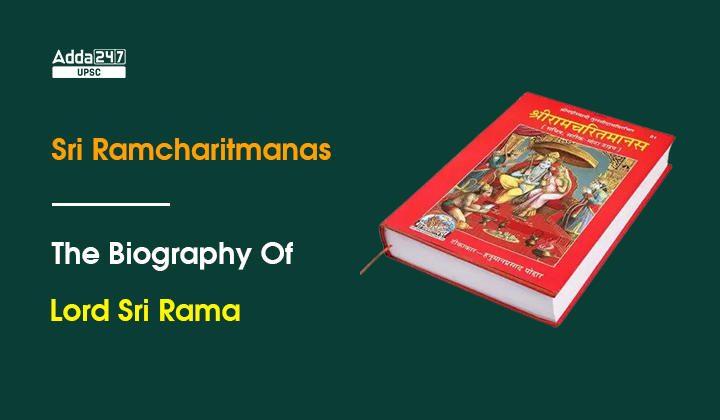Table of Contents
Sri Ramcharitmanas: Sri Ramcharitmanas is considered as one of the greatest works of Hindu Literature. Sri Ramcharitmanas was written in the Awadhi language during the 16th century by Great Sant and Rambhakt Sri Tulsidasji.
In News?
- Recently, Education Minister Of Bihar, Mr. Chandrasekhar, referring to Ramcharitmanas’s chaupai ‘adham jaat me vidya paye, voihu yaya ahi dudh paile’, said that Ramcharitmanas is a book that divides society.
- Misleading the students at Nalanda University, he said – Ramcharitmanas is a book that spreads hatred in the society.
What Is The Significance Of Thiruvaiyaru Thyagaraja Aradhana Mahotsava?
What Is The Chaupai And Its True Meaning?
The Chaupai Is:
हर कहुँ हरि सेवक गुर कहेऊ
सुनि खगनाथ हृदय मम दहेऊ॥
अधम जाति मैं बिद्या पाएँ।
भयउँ जथा अहि दूध पिआएँ॥
Meaning:
Here Kakabhushundi in the form of a crow calls himself meaningless, but the education minister of Bihar explains it to divide the Hindu society.
Sri Kanaka Dasa: A great poet and musician from Karnataka
Why Hinduphobic Groups Attack Ramcharitmanas?
- Tulisdasji wrote this Mahagrantha at a time when Bharat was faced with Mughal invasions.
- At that time hindus did not know how many temples would be destroyed and how long they would have to struggle against the Islamic forces.
- In such an atmosphere, the grantha instilled spiritual fervor and courage in the Hindus.
- The grantha also repeatedly defeated the agenda of the missionaries and other Hinduphobic groups.
- This grantha has primarily contributed to destroying the agenda of the break India forces.
- Since their agenda has failed due to the divine Grantha Sri Ramcharitmanas which continue to rule the Hindu mind, such granthakars are attacked by Hinduphobic forces.
- They question the composers so that their work can be termed unreliable.
About Sri Ramcharitmanas
- The epic Ramcharitmanas was written in the Awadhi language by Great Rambhakt Sri Tulsidas Ji in the 16th century, where Goswami Tulsidas Ji adapted the original stories of Ramayana with new generations in view.
- The Ramcharitmanas is by no means a word-for-word copy of the Valmiki Ramayana or a condensed account of the latter.
- Sri Ramcharitmanas has elements from many other Ramayanas previously written in Sanskrit and different Indian dialects and stories from Puranas.
- Sri Tulsidas Ji calls the epic Ramcharitmanas the story of Rama, which was stored in Shiva’s mind (Manasa); later, he narrated the same to His consort, Devi Parvati.
- Sri Tulsidas claims to have received the story through his guru, Narharidas.
- Sri Tulsidas Ji was a naive child, and the story was stored in his mind (Manasa) for a long time before he wrote it as Ramcharitmanas.
- Therefore, the epic poem is also known as Tulsikrit Ramayana (The Ramayana composed by Tulsidas). The Ramcharitmanas is a masterpiece of vernacular literature.
Difference Between Sri Ramayana And Sri Ramcharitmanas
- Sri Ramcharitmanas and Sri Ramayana are two different versions of the Rama story written in Sanskrit and Awadhi.
- There are some differences between them regarding the style of poetry used, composition, the religious significance, and the like.
- Sri Ramayana is written by the sage Maharshi Valmiki. It is considered Adi Kavya or the first book of ornate poetry.
- Sri Ramcharitamanas is based on Maharshi Valmiki’s original work. It was written by the great Awadhi poet Goswami TulsiDas.
- It is important to note that Sant Tulsidas Ji compared the Seven Kandas or chapters to the seven steps leading to Lake Manasa.
- It is popularly believed that a bath in Manasarovar, near Mount Kailash, brings purity to mind and body by removing all kinds of impurities.
Which Are Seven Kandas Of Sri Ramcharitmanas?
- Sri Tulsidas Ji wrote the work in seven Kandas, and they are called Bala Kanda, Ayodhya Kanda, Aranya Kanda, Kishkindakand, Sundar Kanda, Lanka Kanda, and Uttar Kanda.
- This is the main difference between Valmiki Ramayana and Ramacharitmanas.
- Sri Tulsidas Ji did not write the sixth chapter under the title Yuddh Kanda but instead titled it Lanka Kanda.
Interesting Facts About Sri Ramcharitmanas
|
The Geo-heritage Value of Ram Setu- The Hindu Editorial Analysis
Know About Goswami Tulsidas Ji
- Sri Tulsidas Ji was born on the Saptami Tithi of Shukla Paksha(Probably in 1531) of the month of Shravan (July or August on the banks of river Yamuna in Rajapur, Uttar Pradesh (also known as Chitrakoot).
- His father’s name was Atmaram Shukla Dubey, and his mother’s name was Hulsi Dubey. Tulsidas Ji stayed in his mother’s womb for 12 months, according to a legend.

- At the time of birth, Tulsidas had 32 teeth; he did not cry but spoke the name of Ram, so his childhood name was Rambol.
- Sant Tulsidas Ji was 77 years old when he composed Ramcharitmanas. Tulsidas started writing it in 1574 AD and completed it after two years, seven months, and 26 days in 1576 AD.
- Sant Tulsidas Ji is also considered as an incarnation of Maharishi Valmiki. Lord Shiva inspired him to write Ramcharitmanas in a dream.
Interesting Facts In Sri Ramcharitmanas
|



 TSPSC Group 1 Question Paper 2024, Downl...
TSPSC Group 1 Question Paper 2024, Downl...
 TSPSC Group 1 Answer key 2024 Out, Downl...
TSPSC Group 1 Answer key 2024 Out, Downl...
 UPSC Prelims 2024 Question Paper, Downlo...
UPSC Prelims 2024 Question Paper, Downlo...




